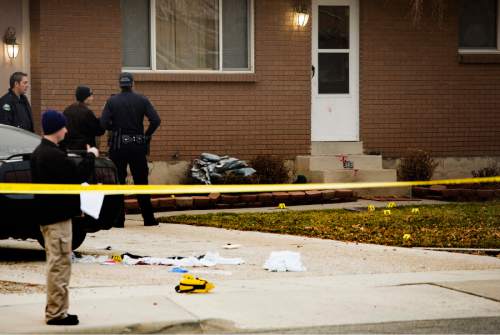This is an archived article that was published on sltrib.com in 2016, and information in the article may be outdated. It is provided only for personal research purposes and may not be reprinted.
Statistically, Utahns are more likely to die from a bullet than a car crash — and the gap between the two causes of death has grown in recent years.
There are a few ways to look at this. You can celebrate advancements in car safety and road construction, or you can lament the rise in gun-related suicides. Or, as is often the case, you can turn it into a talking point in the highly emotional debate over gun laws.
Let's tackle all three, starting with gun politics.
The Violence Policy Center, a group promoting gun control, releases an annual report identifying states where gun deaths are more common than motor vehicle-related fatalities. In 2009, there were 10 and Utah was barely among them, with 260 gun deaths and 256 vehicle deaths. A better way to look at it is a rate, which accounts for a growing population. In 2009, Utah had 9.34 gun deaths per 100,000 people. The rate for vehicle deaths was 9.19 per 100,000 people.
The latest report, released this week, is based on 2014 data; in that year, 21 states and the District of Columbia made the center's list. Utah's gun-death rate was 11.45, and the vehicle rate was 8.87.
The center argues guns should be regulated for health and safety just as cars and roads are. As a result of government regulations, public-service announcements and carmaker initiatives, vehicles are safer. There are seat belts and air bags, reinforced passenger cabins and cameras to help drivers back up, not to mention better signage and lighting on roads. Through these efforts, vehicle-related deaths have dropped steadily over the years in Utah and throughout the nation.
At the same time, gun deaths have continued to creep up.
"People want to imbue guns with some sort of special significance, but when you get to the essence of it, it is a consumer product," said Kristen Rand, the Violence Policy Center's legislative director.
Rand wants basic standards to make sure defective guns don't hit the market, public-education campaigns to talk about the risks associated with guns and more research into gun production, sales and use in crimes.
She also wants many of the same gun-control measures called for by President Barack Obama. Her group advocates a ban on military-style assault weapons and limits on high-capacity magazines. She also wants to tighten restrictions on who can carry a gun in public.
All of this irritates Clark Aposhian, one of Utah's leading pro-gun lobbyists. He said it is preposterous to argue that there are many "junk guns" on the market, which may fire if dropped. He also says it is disingenuous to talk about guns as a public-health hazard and then try to ban assault weapons, because assault weapons are not the reason gun deaths have ticked upward.
"My adversaries could have their way and ban all guns and they are going to solve, what, one-fifth of gun deaths in Utah?" he said, suggesting that criminals would still get their hands on guns no matter the laws. "It is not a gun problem — it is a suicide problem."
Suicides accounted for 63 percent of gun deaths nationally in 2013, up from 61 percent the previous year. And Utah has consistently had one of the nation's higher suicide rates. A state study looking at gun deaths from 2009 to 2013 noted that 87 percent were suicides.
Aposhian's Utah Shooting Sports Council is part of a coalition working on an anti-suicide campaign because, as he puts it: "The left and the anti-gunners do not have a monopoly on grief when someone is killed with a firearm."
He argues restricting guns wouldn't stop people intent on ending their lives; they may try pills or poison or some other way. Rand, however, notes a demonstrable increase in suicide risk when there are guns in a home.
One thing Aposhian didn't quite understand is why the center compares deaths related to guns and cars.
Rand said the main point is they are both products people can buy and the government, in theory, could regulate.
Another possible answer could be because the Centers for Disease Control and Prevention, which tracks mortality data, makes it really easy. On its "FastStats" page, it lists deaths by four topics: all injury, poisonings, firearms and car crashes. For the record, you are more likely to die from a poisoning, even an accidental poisoning, than from a car crash or a gunshot.
Twitter: @mattcanham



